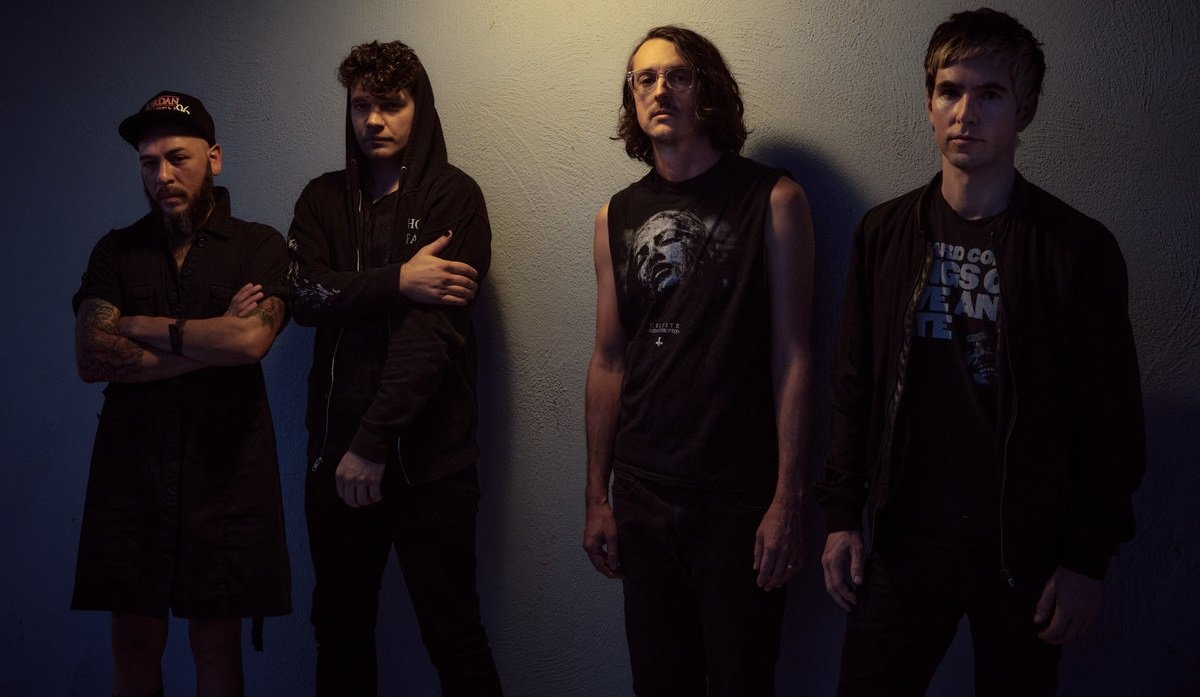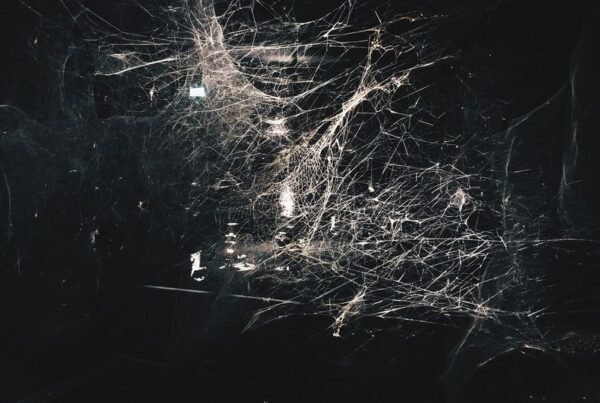Glassing‘s new album Twin Dream is such a bonafide monolith, providing material to chew on for days on end, that in order to properly dissect it, I teamed up with a fellow writer to dig into its deepest core by means of a conversation between gentlemen, which you can now read from below.
No ‘how do you do’s, no bullshit, but straight to the point: why is Twin Dream such a majestic experience as it is?
Robert: I didn’t even actually know that there was a new Glassing record happening until it was like a couple of weeks or so from release. I remember discovering Spotted Horse at the insistent recommendation of a friend. While the sound was jarring at first and somewhat difficult to digest, it really grew on me. I had an amazing time listening to Twin Dream, and I feel like it really shows us how the band has propelled forward on basically all fronts. What do you say? Also, is this your first interaction with Glassing?
Eeli: Well, funnily enough, I had no idea about the new record either, until seeing posts about it emerge during the day of its release, I think. That instantly threw me back to discovering Spotted Horse back when it came out, and even though I thoroughly enjoyed that album, for some reason I didn’t really keep tabs on the band, aside from occasionally revisiting the previous record.
R: Haha, well ain’t that something? Anyway, Twin Dream is really something else as I gaze upon its massive contents. I find it impressive how it manages to feel so large and intimate, so crushing and empowering, so subtle and jarring, so abrasive and so smooth. It seems like the band further explored the power of contrast while polishing their sound both tonally and structurally. It’s rare to come across a record that both feels like a raging, cavernous nightmare and an effortless cruise among the stars.
E: You know, I completely agree. Spotted Horse had some truly magnificent moments, especially once it fully opened up after a while, but Twin Dream feels continuously like that, as if it was one elongated moment of excellence just stumbling upon itself and discovering new things from its essence along the way. It’s just heavy as all fuck, not only by production, but by its atmosphere as well. That, in particular, I think, is a definitive strong suit with Twin Dream – the ebb and flow is immaculate despite the overwhelming, wall-of-sound-ish tones.
R: In some twisted way, the flow of the record kind of reminds me of Follow The White Rabbit‘s Endorphinia. It uses an oddly personalized and authentic delivery of a hardcore-influenced backbone, which is rife with explosive moments and incredibly groovy bits, only to be offset later on by weirdly surreal and soothing passages that rely on slowly evolving textures to make their point. Sure, the two records couldn’t really be further apart from each other, and I sometimes can’t help myself shoehorning in some mention of Endorphinia, but I feel like the comparison is somehow warranted. I found myself being mesmerized by the delivery of Twin Dream: it really has a tender magic going for it in moments like on the closer, “At Long Last” – finding myself on top of my desk headbanging like neck injuries aren’t a thing – to spicy parts like that incredible riff around the one-and-a-half minute mark from “Absolute Virtue”. The latter somehow reminds me of “Way Out” off Spotted Horse, with its general tone and the ‘one crazy, sick riff going twice’ treatment.
E: That juxtaposition kind of plays an integral part on the album, doesn’t it? It’s awe-inspiring that Glassing are able to unite these types of extremes together so fluently. It’s really cool to hear such a unison between so vastly different styles, and how effortlessly the change happens. I think the best example of this is the not-so-subtle shift from “Godless Night” to “Doppler”. They’re so far away from each other, but so clearly cut from the same cloth, that it’s nothing short of being impressive. I also generally see all kinds of additional effects etc. as obvious, albeit oftentimes essential, rectifications rather than points of interest – something that I normally don’t tend to underline unless the situation actually warrants it, which is the case with Twin Dream. All the FX happening here and there throughout the album, whether standard delays or reverbs, or something else, add significant weight to the record’s overall value, and to its murderous mood.
R: I am totally on board with the effects remark. They’re actually pretty subtle given the monolithic display that goes from minimalist to maximalist. I think they’re also very neatly placed and actually a requirement, as the band practically takes shoegaze, hardcore, post metal, doom metal, black metal, and ambient music and whirrs it into a dizzyingly beautiful whirlwind of raw emotion. I’m usually not all that on board with such raw deliveries, less so with an equally raw tonal presentation, but it just works so well in this case. It’s also entirely too obvious that the members jive fluidly with each other and all have very clear visions of what they’re going for. Twin Dream feels like a band’s, like, fifth or so release, not even close to what a second album would kick like.
E: Yeah, it really does. Glassing have what the old people would call ‘vision’, and not only that, but they actually redeem it and excel by doing so. I think Twin Dream is one of those albums that on paper would look like a complete mess that shouldn’t yield any kind of tolerable results, yet here we are. The rawness versus polish also caught my attention; it’s as if they approached each track separately to produce and mix them the way they needed to, instead of just applying a general mold and slight variation to each. The tonal spectrum is just immense, but very delightful once you actually get a grip on it.
R: It’s obvious they gave the production process the same amount of attention as they gave to the general songwriting, and as well as their signature instrument tones. It’s nice to see that there are bands out there really going this hard into making sure an album is exactly how they want it and do not skim on the work needed to ensure that something is done to the best of one’s ability. It’s also rare in metal/extreme music to see a band so invested and careful about their production. We’re so used to cookie-cutter mixes and masters, as well as post-prod magic, that we’re surprised when we hear something done ‘right’. That’s kind of sad, but I guess it applies to most other music as well (except jazz), although I feel it’s the most glaring in metal.
E: It’s definitely the most tangible in metal, yes. I think that a lot of people, whether artists or listeners, have just grown accustomed to that sterile nonsense. Now, that angle works well at times, but it more often than not ends up hurting the actual product, when all humanity and emotion are simply cleared just to sound ‘right’, whatever the fuck that is. In order to not sink further into our hype boots, did you notice any pitfalls or other negative aspects, however minor, on Twin Dream? There’s two things that slightly bother me on it, but I’d like to hear if you got any thoughts in that vein.
R: I know it sounds corny or whatever, but for all intents and purposes it’s a practically flawless record. If I were to nitpick over something, I guess I don’t really understand how or why the track divisions are made like this. For example, “Faint” could’ve easily been the ending to “Absolute Virtue” or the intro to “Twin Dream”. That being said, I’d like to know what you have to nitpick about.
E: Fair enough. My ‘issues’ with it are definitely from the nitpicky end of things, but something that resurfaced every time I listened to it. I do think there’s a bit of a slump on the latter half, as the momentum gets a bit lost towards the end. I guess that mostly ties in with the order of the songs, as this could’ve been avoided very easily. And I don’t mean that the above would REALLY diminish the experience the album offers, but I can’t not mention it as it’s something I thought about often. The other thing is that the vocals could be more upfront at times, since, all things considered, they are the one adhesive element gluing everything together. Although, I understand they’re also treated as an instrument of sorts amongst the others rather than a leading one, so there’s that. This isn’t too troubling in the entirety of the record, but there’s certain, usually very loud portions with next to no dynamics, where I think they could’ve benefitted from having the vocals momentarily in the spotlight.
R: The vocals definitely act as more of a mood catalyzer/just another instrument in this setting. I didn’t think about it like that, but as you mention it, I do agree that there are times when it could’ve used more of a spotlight, both for the soft and the aggressive parts. Similarly for the order of the songs, I didn’t actually notice anything, but as you brought it up, I can’t exactly disagree either. Although, it didn’t really bother me enough to notice it – apparently – and I’m usually always picky about how the songs are ordered on a record. I think that the song order is probably the least of a ‘flaw’ between these two. I really didn’t register anything off going through the record several times and it flows just right.
E: Fair enough. I wouldn’t characterise it as a flaw per se, but perhaps an oversight. Either way, it really doesn’t hurt the record’s majesty in the slightest. I can appreciate the songs’ individuality that we touched on earlier a lot, and it definitely weighs in the scale more. I think there’s very little for me to add to what we’ve discussed, since Twin Dream truly flourishes through the process of listening, and words can only take you so far. Did you have further remarks or points you wanted to touch on?
R: Not really, I feel like we’ve pretty much summed up the majesty of this record. It would be difficult to appropriately illustrate the depth and breadth at which it manages to manifest moods and ideas, so it’s obviously a more fitting task to have a proper listen to it over a strong drink, gazing into the barren, winter landscape. It’s a bleak yet hopeful singularity which really cuts to the core of human polarity from an emotional standpoint. At least, that’s how it plays out in my head anyway.






